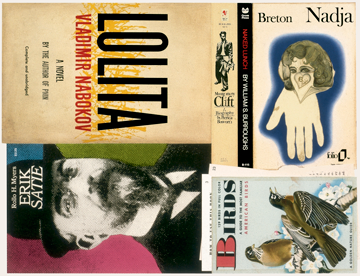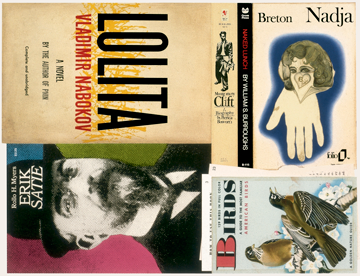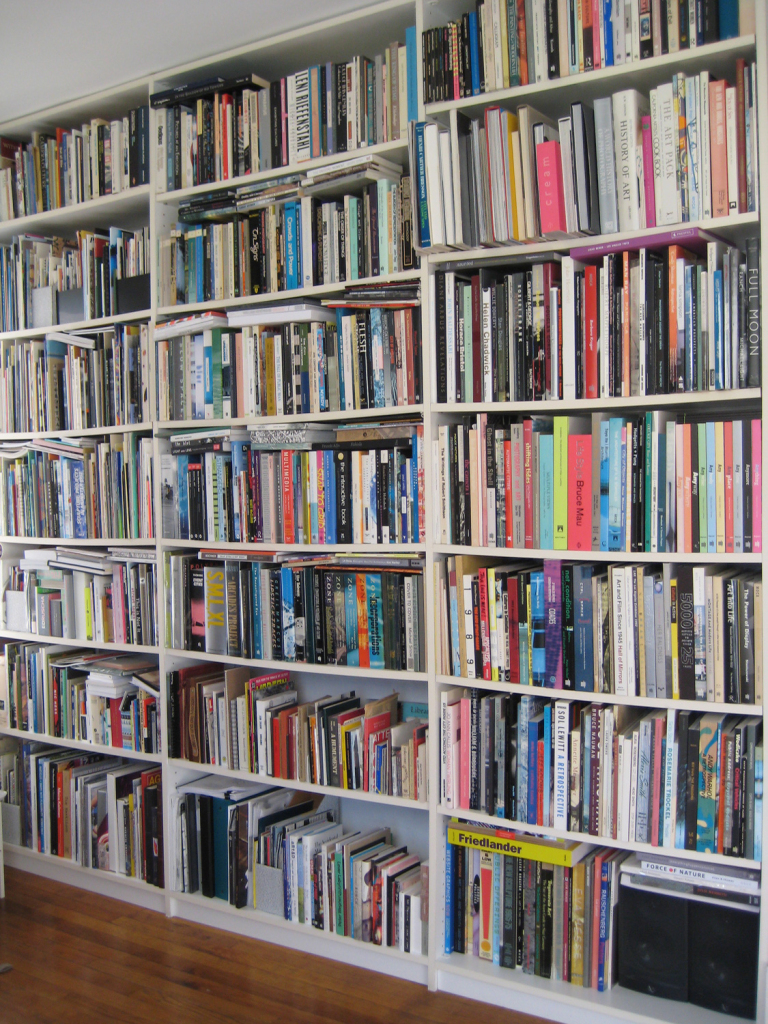Lately, we’ve been inviting artists to respond to art on view at LACMA in the form of web-based projects. On a recent visit, Jody Zellen suggested a project inspired by the Steve Wolfe show, on view through February 20.
Jody’s piece, Spine Sonnet, generates an image composed of fourteen spines from books in her nonfiction library. Refresh the browser to cycle through various combinations.
Below, a short Q&A with Jody about her project.
We invited you to visit LACMA and respond to anything that grabbed you. Why did you choose to respond to the Steve Wolfe show?
I was immediately drawn to and struck by his craft and the fact that these were trompe l'œil paintings of books—for the most part they were old books that had a beautiful 50s coloring and design aesthetic that I feel has disappeared. Everything is going digital; he is preserving them by painting them. That was interesting to me. And his pieces are quite beautiful.

Untitled, (Study for Mumm/Jose Cuervo Cartons) Steve Wolfe, 1994. Collection of Lawrence Luhring.
How did you approach the project?
I’ve always been sort of fascinated when I have a pile of books on my desk and I look at the titles, how those titles become something. When I got home I was looking at my bookshelf and thinking: is there something I can make that takes its point of departure from the ideas of books as precious and meaningful? And I came up with the idea of trying to make a poem by linking all of the titles on the spines.
I went through the process of scanning every single book in my library. I have two libraries: a library of fiction, and a library of art books. I decided that I wouldn’t use the fiction books because they seemed to be too much about the author’s name and I was interested in the titles of books.
I wanted it to randomly arrange itself so that every time you refresh the browser it would appear differently. Would it be vertical or horizontal? I wanted all the books to be horizontal, so you could read them like you might read a poem.
How many? I came up with the idea that a sonnet is fourteen lines, so if it was fourteen books and I called it Spine Sonnet, it could relate to that form.
Because we live in Southern California and there’s a lot of light that filters into my library, it’s caused my books to fade, so they aren’t pristine; they’re well-used and ragged around the edges. I thought that related to Steve Wolfe’s work because the books that he’s chosen to reproduce or paint are not in perfect condition.
In terms of how the selections were ordered, I have twenty-one shelves. Each line of the poem comes from a certain shelf. That was a way for me to organize the arrangement and still keep it arbitrary.
What arrangement are you looking at on your browser right now?
Mine is: Crucial Condition/Particles and Waves / With Possibility / Angry Women / Voyeur / Fish Story
It really does read as a kind of interesting poem.
Mine reads: “Discontents/River of Shadows / Ghost Stories / Notes in Hand / Full Moon / City of Panic / Polyphilo or the Dark Forest Revisited / Architecture of Fear / The Digital Dialectic / Camera Lucida / Reconstructing Modernism / Public Offerings / Automatic Cities / True Stories.”
How do you feel about the way the project turned out?
I was very happy with it. As soon as I tested it, I was excited. This is exactly what I’ve been looking at in my mind for years and never had a way to make it into something I could share.
What interests you about the web as a medium?
It’s public art. You don’t need four walls of a gallery and a defined period of time; it’s out there and it’s permanent.
I’m interested in how I can push interactivity. How can I make something dynamic that takes over your computer? How can I push the technology from a non-programmer’s really low-tech point of view?
I’m not a programmer, I’m an artist and I’m coming to this medium bringing text and images—asking, how can I put them together, how can I make them change, how can they be different every time you look at them? How can I lead someone through a narrative?
For more on artists’ relationships to books, come to the museum next Monday, February, for Conversations with Artists: Artists and their Books. Curators Franklin Sirmans and Leslie Jones will talk with artists Andrea Bowers, Francesca Gabbiani, Alexandra Grant, Julian Hoeber, Dave Muller, and Mungo Thompson, in conjunction with Steve Wolfe on Paper and R. B. Kitaj’s Covers for a Small Library.





